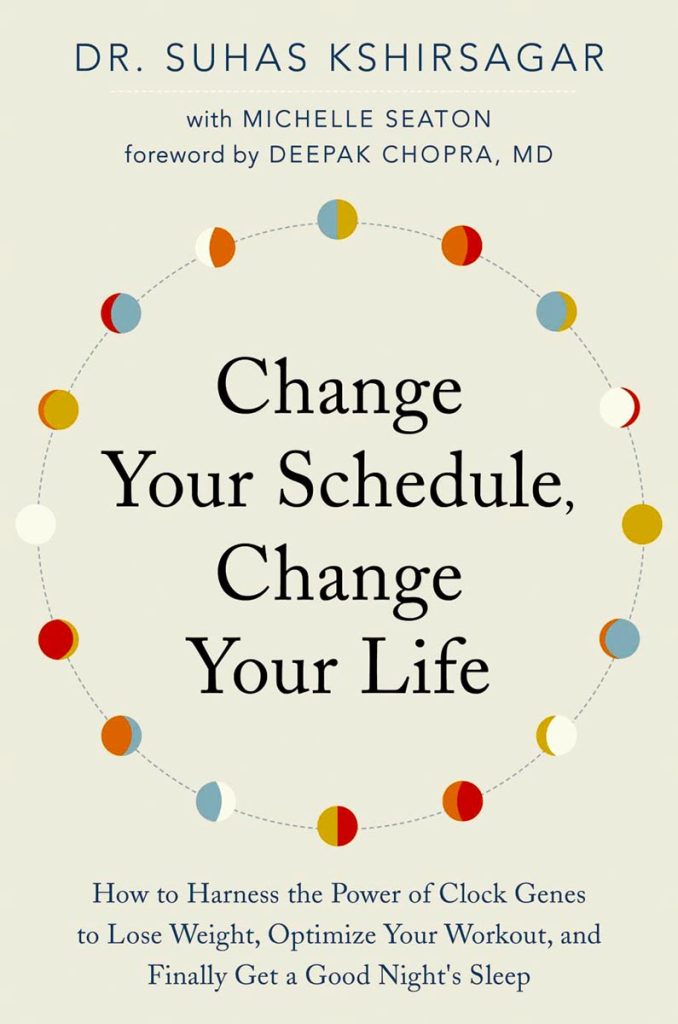Ancient Ayurvedic wisdom for modern man’s malaise

Change your schedule, change your life contains what might just be the last missing puzzle piece to fine physiological functioning many just can’t seem to find. What is it you ask? Alright, we’ll tell you: it’s a clear understanding of the laws governing harmony between your mind, body and the universe applied through a consistent practice of mindfulness. Just as one ignorant of the laws of physics might fire an arrow into the sky for fun, one naive of ayurveda, the laws of life, might gorge on ice cream as a midnight snack, blissfully unaware of the pain that will inevitably ensue. This book is your manual of the biological justice system to heed so the citizens of your great bodily empire do not suffer the dictates of an ignorant king.
Perhaps none is more fitting to share this knowledge with the modern mind than ayurvedic physician Dr. Suhas Kshiragar. Being the director of a wellness clinic in Northern California with an MD in ayurvedic internal medicine from Pune University in India, Dr. Suhas understands the East and West, bringing together the best of both. His experience shining through each page as anecdotes from those he has personally worked with keeps the book from ever feeling out of touch.
Skeptics of generic self-help books might be frightened by the cover’s mundane design and cookie-cutter blurb, but fear not, as upon further reading it becomes clear that assessment is premature. This understated masking appears to be a tactical choice to entice the uninitiated into grabbing the book off the shelf before realizing it’s all about an Indian health science they may have never heard of before.
Those who make it past the cover are immediately rewarded by an enticing exposition on the modern discoveries backing ayurvedic insights. At the core of this science is a small bundle of neurons right above the optical nerves called the suprachiasmatic nucleus, or SCN. All your cells have a tiny biological clock modifying their function with the time of day. When you see light, the SCN tells your cells to reset their clock and begin their daily routine just like us. Thankfully, they don’t take holidays! This discovery is revolutionary, as it proves that your biological functions change depending on the time of day. Ayurveda advice has always taken into account the daily cycles of the body, but only now are we understanding exactly why. As reason functions more slowly, yet does not conflict with intuition, modern scientific discovery fully supports what ancient Indian sages proved to themselves thousands of years ago.
A great strength of Dr. Suhas is his ability to explain complex concepts with compelling metaphors. He explains the role of the SCN as “the brain’s master conductor, and all of your body’s cells are trying to dance to its beat.” From this realization Dr. Suhas builds the rest of the book as a master course in performing our daily dance of routine in harmony with our biological dance.
For example, chapter six, titled “You Are when You Eat,” outlines the hidden-in-plain-sight key to weight management. It begins like a typical chapter, with compelling anecdotal observations from Dr. Suhas’s work in the field. He recounts his patients trying to lose weight by fasting throughout the day until finally breaking down and bingeing on a buffet at night. To one familiar with the Western conception of managing weight by consuming a set number of calories this might not seem too bad. It would, however, be contraindicated under ayurvedic wisdom, which states that food is best eaten when the body’s digestive fire, or agni, is at its strongest. Naturally this is when the ball of fusion fire in the sky is at its highest, around noon, known as pitta time.
Knowing such intuition might not be compelling enough for his audience, Dr. Suhas brings in the latest science, citing how SCN activation modifies gene regulation throughout the body, generating cyclical changes in glucose tolerance, metabolism and even insulin sensitivity. In the evening, when SCN activation is at a minimum, all of these important digestive factors are waning. A 2014 study of 1,245 people, following their eating habits for six years, found those who ate over half their daily calories in the evening were twice as likely to have developed obesity or other metabolic issues. Not to fear though, as Dr. Suhas does a remarkable job at clearly outlining immediate changes you can make in your life. Exercise and sleep are subsequently shown to be surprisingly connected and by altering the cells’ clocks they affect the entire body system in powerful ways.
Dr. Suhas’ effective, no-nonsense approach is best highlighted in the second chapter, where he states, “In the coming chapters, you will learn.… However, if you only do three things, they should be…” then proceeds to list out the entire book’s distilled wisdom in three bullet points. However, stopping here would be a mistake as Dr. Suhas has yet to reveal the rocket fuel for your transformative journey. As he so wisely states, “The greatest battle is not with our bodies but with our minds.” Even if you memorized every word of the book, it would do no good without application. Dr. Suhas observed simple mindfulness to be the most effective tool for his patients in changing unhealthy habits. Once you experience for yourself the body’s painful reactions to actions, the correction happens almost automatically. The citizens of your body know what you need and are constantly trying to let you know. A lot of the time, however, we simply aren’t listening. As the Tirukural so wisely states, “An inaccessible ruler who listens and adjudicates inattentively will inevitably plummet from power and perish.”
So if you struggle with fatigue, weight gain, or just general malaise and are looking for a change, drink from this wellspring of ayurvedic wisdom, and, as this review previously admonished, stop shooting arrows into the sky.
